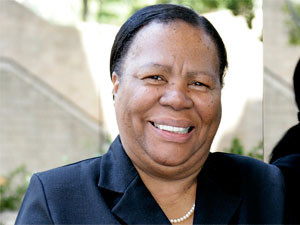
Science and technology minister Naledi Pandor yesterday challenged the ICT industry to engage more with government around the 'Fourth Industrial Revolution' and the opportunities it presents for SA.
Delivering the keynote at the Cisco Connect South Africa conference in Sun City, Pandor said government had been intrigued by the concept of the Fourth Industrial Revolution - introduced in January 2016 by the WEF's Klaus Schwab - and deliberations were happening in Cabinet to ensure the country was not left behind.
However, she said Cabinet was being left to guess at what should be done because technology companies were not engaging with it around the issue.
"I have not seen many of the leading technology companies come to us to say 'Ministers, South Africa must be part of this fourth revolution and to do so the following should happen'."
Key areas where engagement was essential would be around what legislation was necessary, where research should be focused, and what areas should be bolstered in order to benefit from the next wave of the digital revolution.
Pandor added this engagement needed to happen sooner rather than later, with the hosting of the World Economic Forum on Africa in Durban in May being a key event where government needed to speak with authority on the issue.
paper records
The minister stressed the opportunities that technology and innovation offered to the country on both the economic and social levels, including agriculture, education, communication, commerce and healthcare.
She highlighted how, even though most people in the country had access to basic healthcare, people were spending far too much time accessing these services.
"When I visited my aunt in Johannesburg, she had gone to the hospital to get her chronic medication and there were 350 people in the queue after her and for many of them it was a process that would take the entire day."
She questioned why people should sit in a queue for an entire day when they could be out doing other, more productive things.
Pandor noted that because patient records were still not digitised, the longest wait for patients at a hospital was waiting for their file to be found.
She added the country needed to give greater attention to digitising paper records - referencing the vast amounts of paper records held by the Department of Home Affairs - and that digitising these offered an opportunity to deliver a radical shift in the way the poor and marginalised experienced service delivery.
Private business, government and research
To drive innovation, there needed to be effective collaboration between private business, government, and regional and national research institutions.
She pointed to the success of the Square Kilometre Array (SKA) as an example of how the country was positioning itself as a strategic partner and an attractive destination for global science and technology infrastructure, products, projects and investment.
The minister named Cisco, Intel and IBM as key partners in this project and said the advancements around big data that would come out of the SKA, and the precursor Meerkat project, if taken advantage of properly, could result in SA becoming a leader in this field.
Pandor added that companies were not taking advantage of the tax incentives offered for research and development in SA, but that the private sector was a critical component in helping government achieve its aim of increasing the percentage of the GDP spent on R&D from the current 0.8% to the target of 1.5% by 2019.
The minister specifically mentioned General Electric, which spent R500 million on a customer innovation centre in Gauteng, along with a further R200 million to support SMMEs through technology transfer; IBM's R700 million investment over 10 years in ICT research and development; and Cisco's R66 million partnership around the SKA and the establishment of a Centre for Broadband Communication at Nelson Mandela University in Port Elizabeth.
* ITWeb and ITWeb Brainstorm are media partners for Cisco Connect South Africa 2017.
Share